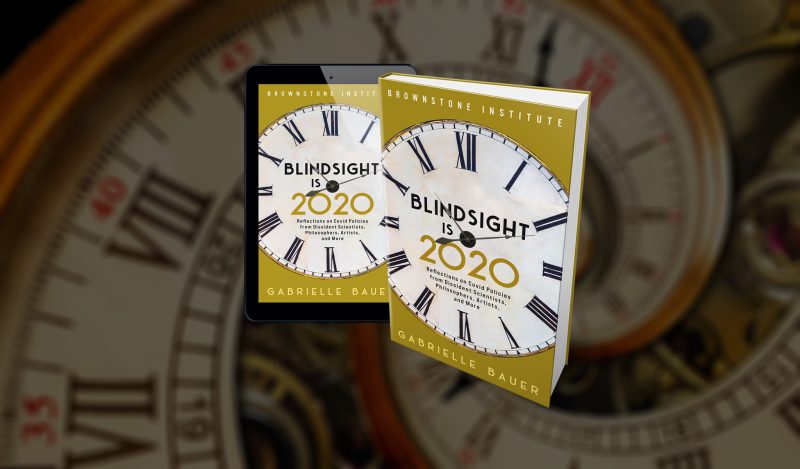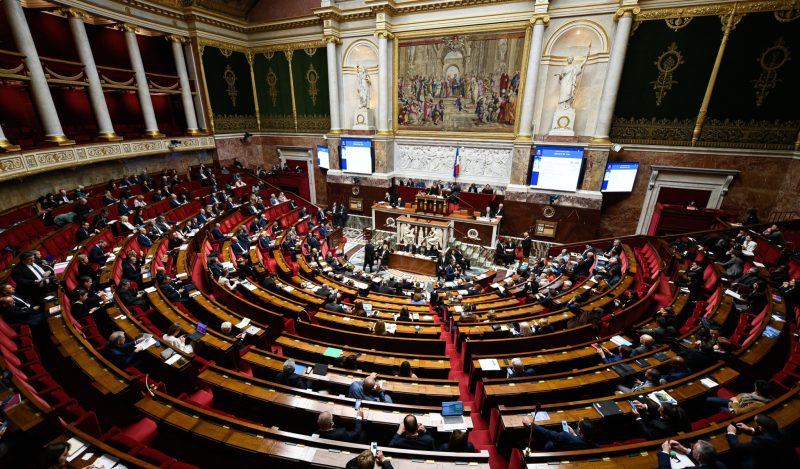If you objected to lockdowns, mask mandates, or vaccine passports, you must be right wing. Not just right wing, but far-right. Or alt-right. Some kind of right, anyway. You’re also white and you think racism is a leftist invention. I’m improvising a little, but you get the point.
[This is an excerpt from the author’s new book Blindsight Is 2020, published by Brownstone.]
Within days of the pandemic’s inception, criticism of lockdowns and other restrictions became conflated with right-wing politics. This put lefties in a bind: if they didn’t support the restrictions, they might be mistaken (the horror!) for a conservative—or worse, a soldier in Orange Man’s army. They latched onto the mask, the left-wing answer to the MAGA hat, as a badge of their political allegiance.
In the US, many people admitted as much: I wear a mask outside so people won’t think I’m a Republican. Lindsay Brown, a Canadian woman and prolific Covid tweeter, went a step further: “If you think you’re on the left and you’re not wearing a mask in public indoor spaces, you’re not.”
If you think you're on the left and you're not wearing a mask in public indoor spaces, you're not.
— Lindsay Brown – @lidsville@mastodon.social (@Lidsville) September 10, 2022
I don't know why this is hard to understand.
Despite this enormous social pressure from their ranks, a small cadre of left-wingers stepped up to challenge the orthodoxy. In print, on air, and online, they argued that one-size-fits-all restrictions disproportionately impact working-class communities, who can’t easily retreat to home offices tricked out with stained-glass lamps and WiFi and Alexa. They pointed out that school closures widen the educational gap between the privileged and the working class, who don’t have the resources to hire tutors or speech therapists for their kids. They took issue with the censorship of dissenting views on pandemic policy, conveniently lumped together as “disinformation” by legacy media.
Suppression of dissent is the pandemic hill that Matt Taibbi has chosen to die on. To those who say that free speech does too much damage in a pandemic, he counters that a pandemic makes free speech more important than ever.
One of the most trenchant investigative journalists of his generation, Taibbi began reporting on politics for Rolling Stone in 2004 and received a National Magazine Award for his contributions to the publication. He gained prominence (and displayed his leftist stripes) for his takedowns of Wall Street during the global financial crisis of 2008-2009. He has written several books, all colored with rage against the political machine. Politically, Taibbi has described himself as a “run-of-the-mill, old-school ACLU liberal” and unabashed Bernie bro.
Mainstream media being an obviously unsuitable vehicle for exploring censorship by mainstream media, Taibbi took to Substack, an online newsletter platform that allows writers to send posts directly to paying subscribers. The lack of corporate oversight or advertisers limits opportunities to censor the content, making the platform a perfect match for the likes of Taibbi—articulate and well-respected malcontents who can finally say what they damn well please and get paid for it (in Taibbi’s case, rather well).
An April 2020 article extolling the advantages of Chinese media control over American free speech in the Covid era had Taibbi all fired up. “The people who want to add a censorship regime to a health crisis are more dangerous and more stupid by leaps and bounds than a president who tells people to inject disinfectant,” he wrote in his newsletter. “It’s astonishing that they don’t see this.”
A follow-up post two years later finds him gnawing on the same bone, explaining that the censors utterly misunderstand the “calculus of free speech.” They assume that scrubbing the Internet of “misinformation” will solve the pesky problem of non-compliance: the partiers will limit their social interactions, the anti-maskers will cover their faces, and the vaccine holdouts will roll up their sleeves. But “the opposite is true,” he writes. “If you wipe out critics, people will immediately default to higher levels of suspicion. They will now be sure there’s something wrong with the vaccine. If you want to convince audiences, you have to allow everyone to talk, even the ones you disagree with.”
Taibbi also invites the official purveyors of pandemic information, such as Fauci and the CDC, to review their own track record: ventilator good, ventilator bad. Mask off, mask on. Use this mask. No, that one. Or maybe both. The vaccines stop transmission. The vaccines were never meant to stop transmission. Or this rather stunning volte face from White House Covid Response Coordinator Ashish Jha: “We used to spend a lot of time talking about 6 feet of distance, 15 minutes of being together. We realize that’s not actually the right way to think about this.”
There’s nothing wrong with changing a recommendation in the face of new data. What some of us can’t forget, though, is the certainty (read: arrogance) with which the public health advisors made their pronouncements, insisting at every turn that “the science is settled.” Nor do we take kindly to the “noble lies” they told us, as when Fauci nudged up the estimated herd immunity threshold in the hope of boosting vaccine uptake. One can hardly fault Taibbi for stating that “the most dangerous misinformation is always, without exception, official.”
Taibbi has good reason to worry about censorship in the Covid era. In 2021, Human Rights Watch, a global organization that investigates and reports on human right abuses, determined that “at least 83 governments worldwide used the Covid-19 pandemic to justify violating the exercise of free speech and peaceful assembly.” They “attacked, detained, prosecuted, and in some cases killed critics” who failed to toe the line, as well as enacting laws criminalizing speech that didn’t align with their public health objectives. The organization called on authorities to “immediately end excessive restrictions on free speech in the name of preventing the spread of Covid-19 and hold to account those responsible for serious human rights violations and abuses.”
While Taibbi’s 30,000 paying subscribers have made him a Substack superstar, not all his fans have followed him to his new sandbox. In a commentary called “What Happened to Matt Taibbi,” journalist Doug Henwood, who once counted himself among Taibbi’s admirers, lamented that “he’s gone off the rails” and is now “obsessed with stupid shit.” It’s true that Taibbi’s targets and topics have shifted: less raging about Wall Street, more criticism of woke campus life.
Instead of celebrating the diversity of thought within the Left, too many progressives view such criticisms as betrayals. To such purists, it’s not good enough to like the tomatoes and cucumbers and green peppers in the left-wing salad—you also have to like the radishes, and if you don’t, you’re out. Some formerly staunch leftists are only too happy to oblige. Fed up with the policing and cancellations, they join communities such as #walkaway or #donewiththeleft. Their actual politics don’t move, but the new Left no longer has a place for them. You may have seen the meme: a motionless stick-figure man, hovering over a horizontal line that keeps shifting leftward. The centrist of 2008 becomes the right-winger of 2022.
Taibbi is that stick-figure man: “It used to be that I was the one furthest to the left in any newsroom,” he tweeted in early 2022. “I am now easily the most conservative, frequently sparking tension by questioning identity politics. This happened in the span of about 18 months. My own politics did not change.”
If questioning policies formerly considered illiberal, like government surveillance, medical coercion, and censoring of scientists, puts one’s left-wing cred in jeopardy, it’s a price Taibbi is willing to pay.
It’s not a coincidence that Matt Taibbi and Glenn Greenwald are friends. They’ve both traversed the same ground, from representing the Left to railing against its excesses. Their free-ranging minds lead them to heterodox ideas that more timid souls won’t touch. And the Right is now claiming both of them as its own.
In case anyone needs an introduction, Glenn Greenwald is an American writer and lawyer who has been called “the greatest journalist of all time.” A resident of Brazil since 2005, the vocal critic of the Iraq War and American foreign policy has contributed to such bastions of left-wing thought as Salon and The Guardian, where he published a series of reports about the global surveillance programs leaked by Edward Snowden. In 2013 he co-founded a news outlet called The Intercept, for which he wrote and edited articles until resigning in 2020 on grounds of editorial censorship.
Left-wing media groups often paint Greenwald and Taibbi as defectors who somehow got away with it, raking it in as independent journalists while refusing to admit they’ve joined the dark side. An article in Current Affairs accuses the pair of spouting “dangerous conservative hyperbole about The Left.” A Washington Babylon piece twists the knife still further, calling the defecting duo “rich pigs who seek to protect their class interests through their writing and social media presence.”1
While rather tiresome, such reactions come as no surprise. Greenwald has committed the unforgivable leftie sin of appearing on Fox News—more than once, proving it wasn’t just a whoopsie. And his contention that the cultural Left “has become increasingly censorious, moralizing, controlling, repressive, petulant, joyless, self-victimizing, trivial and status-quo-perpetuating” cannot have pleased all his old admirers.
Just as Taibbi sniffs out suppression of free speech, Greenwald tracks down (and takes down) hypocrisy. While he has apparently been enjoying this pursuit for some time, as evidenced by his 2008 book Great American Hypocrites, the “rules for thee” politicians of the Covid era made his job easier than ever. Following Obama’s maskless bash of 2021, he noted that liberals have “spent a full year relentlessly Covid-shaming anyone who went outside (unless for liberal protests) or questioning Fauci. But now that their icons threw themselves an opulent indoor maskless party, they announce that only pettiness or jealousy would make you notice.”1
Aside from rubbing Greenwald the wrong way, the hypocrisy undermined the rule makers’ objectives, leading people to doubt or ignore their health decrees: “People aren’t dumb. They see it.”
Does anyone remember how Covid temporarily “disappeared” during the BLM protests of May and June 2020? Greenwald remembers: “After months of being told it’s immoral to leave your house—the argument became: Don’t worry! It’s very hard to get COVID outside if masked.” Before the protests, anyone who whispered costs and benefits was told to stop killing grandmas. Suddenly costs and benefits were all the rage.
“We should always evaluate the risks and benefits of efforts to control the virus,” Johns Hopkins epidemiologist Jennifer Nuzzo tweeted on June 2, 2020. “In this moment the public health risks of not protesting to demand an end to systemic racism greatly exceed the harms of the virus.” Skeptics called out the hypocrisy of supporting one flavor of protest (BLM) and opposing another (anti-lockdown), but not many people listened. In any case, after the riots ran their course, public health advisors lost interest in cost-benefit and the “crush the virus” soundtrack began playing again.
The double standard of blaming conservative but not liberal politicians for Covid failures doesn’t get past Greenwald, either: “More Americans have died of Covid in 2021 than 2020, even though Biden had the benefit of universally available vaccines and improved treatments. Fortunately for Biden, all 2020 Covid deaths were blamed personally on the president but none in 2021 is.”
Like Taibbi, Greenwald has found a congenial home on Substack, where he gets to say the quiet part out loud. “In virtually every realm of public policy, Americans embrace policies which they know will kill people,” he writes in a post about the refusal to assign costs to the Covid policies. “They do so not because they are psychopaths but because they are rational,” reluctantly accepting a certain number of deaths in exchange for policies that make the world a better place. “This rational cost-benefit analysis, even when not expressed in such explicit or crude terms, is foundational to public policy debates—except when it comes to COVID, where it has been bizarrely declared off-limits.”
It’s what pundits dare not say in mainstream media outlets, where the “it if it saves one life” rhetoric has muzzled discourse since the start of the pandemic. But Greenwald understands that to do public health well, you need not only empathy but emotional distance. If a lone grandma pulls too hard on your heartstrings (or your political strings), you end up short-changing the circle of depressed young grandchildren around her. People who lack the fortitude to weigh benefits against costs should write books about puppies and rainbows, not set public policy.
Greenwald also recoils against the authoritarianism that comes with the territory of “crushing a virus” at all costs. “Australia has gone insane on COVID—so far to excessive authoritarian impulses—that it’s hard to put into words at this point,” he wrote in reaction to an Australian news clip showing police handcuffing young beachgoers. “But for some sectors of the liberal Left, this form of authoritarianism—the state controls your actions in the name of protecting you—is appealing.”
Social psychologist Erich Fromm makes a distinction between rational authority, “based on competence and knowledge, which permits criticism,” and irrational authority, “exercised by fear and pressure on the basis of emotional submission.” As Greenwald and others have noted, Covid pushed the needle over the dividing line.
In an attempt to explain “how the Left got duped” into an authoritarian position, Canadian writer Kim Goldberg points to the deliberate use of “pseudo-collectivist messaging designed to resonate with leftist sensibilities.” The feel-good slogans waved around by authorities, like “wearing is caring” or “my vaccine protects the community,” backed leftists into a corner: conditioned to see themselves (and show themselves) as empathetic, they couldn’t challenge these bromides without risking expulsion from their chosen tribe. In practice, Goldberg argues, such messages empower the exploitative systems traditionally opposed by leftists and grant governments and corporations “unfathomable authority over everyday life.” Neither Goldberg nor Greenwald is down with that.
Mainstream progressives don’t know what to make of people like Greenwald, who refuse to confine their opinions to a committee-approved list. Here’s a thought for the tribalists: forget what side of the road he drives on. Trust that he has some interesting things to say about the pandemic. Have a read and have a listen, whether you end up agreeing or not.
Nobody has to wonder about Toby Young’s political affiliations: he flies right and stays proudly on course. A UK writer and editor, Young has worked for The Times, The Daily Telegraph, and Quillette, the Internet’s stomping ground for counternarrative types. His 2001 memoir, How to Lose Friends & Alienate People, reports on his employment at Vanity Fair. His passion for free speech led him to found the Free Speech Union in February 2020 (a rather well-timed launch, as things turned out).
Young has been called a conspiracy theorist, though an introductory note on his website clears up that misconception. Not one to imagine “sinister cabals at work, bent on some secret plot to subvert democratic institutions and usher in a New World Order,” he ascribes the pandemic response to the “cock-up theory of history”—things go wrong because people do stupid shit. “History can in rare circumstances be bent to the will of an extraordinary individual, but it is never planned.”
Anti-vax? Wrong again. He’s just “strongly inclined to postpone the decision about whether to get the vaccine until we have a clearer idea of the safety profile.” (If you’re not sure the meat is fresh, you’re not “anti-meat.”) He also knows how to poke fun at himself, which is more than one can say for many of his left-wing counterparts. In an article for The Spectator, he imagines himself in the hospital with Covid, accepting a phone call from a left-leaning news outlet: “We’re running a story about Covidiots who regret not being vaccinated and wondered if you’d like to comment?”
So he’s not a conspiracy guy and he’s not anti-vax. What he is, unabashedly, is anti-lockdown—for all the usual reasons: shaky scientific rationale, infringement on civil liberties, impact on mental health, and disruption to the social fabric. Like many skeptics, he maintains that lockdowns have no place in a democracy because “they involve the arrogation of power by the executive branch of government at the expense of the legislative branch.” They set a precedent that the state can always reactivate when the next crisis arrives, and to Young that’s just not cricket.
Young’s Lockdown Sceptics website (now rebranded as The Daily Sceptic) performed an invaluable function in spring 2020: letting dissidents know they weren’t alone and helping them find each other. People seeking more personal connections could hop over to the “Love in a Covid climate” section, the idea being that “if you’re a Covid realist you don’t want to go out with a hysteric who thinks the lockdown is being eased too quickly.” (As an aside, my own Q-LIT group spawned a romance that could easily take “cutest couple” honors in a school competition. I felt like a yenta who just scored a match.)
The Daily Sceptic offers a mix of articles written by Young and other iconoclasts from various disciplines. While perusing the archived posts, I stumbled on Newcastle University philosophy lecturer Sinead Murphy, who asks the same question that has been haunting me for three years: Why have democratic societies so quietly accepted the suspension of their freedoms? Drawing on her scholarly reading, she concludes that the new model citizen is basically a young girl, ruled by sentiment and “eminently prepared to relinquish heretofore absolute values.” This prototype has tilted the Covid discourse so far toward emotionalism that rational arguments are recast as “unsentimental, unemotional, and therefore inherently callous.” Given women’s tiresome reputation as the more emotional sex, it pleases me mightily that this diamond-cut observation came from a woman.
Young believes that health and the economy cannot be separated. In a thought piece on the health-economics of lockdowns, he argues that “the choice politicians are making is not between saving lives and economic growth, but between sacrificing lives now and sacrificing them in the future.” When economies contract, “life expectancy declines, due to, among other things, a rise in poverty, violent crime and suicide.”
After taking us through some napkin math, he concludes that the £185 billion forked out to support lockdowns significantly outpaced the traditional upper limit for public expenditures on health: no more than £30,000 to add one year of perfect health to one person. What’s more, the government could have spent the same money to save lives in less disruptive ways.
The outrage mob reacted with the usual epithets: cold, unfeeling, yada yada. You wouldn’t be talking this way if it were you on that ventilator. As a matter of fact, he would: if keeping him alive came at too high a cost to the NHS, “my death would be acceptable collateral damage.” Cold and unfeeling? I call it unselfish.
Published under a Creative Commons Attribution 4.0 International License
For reprints, please set the canonical link back to the original Brownstone Institute Article and Author.









